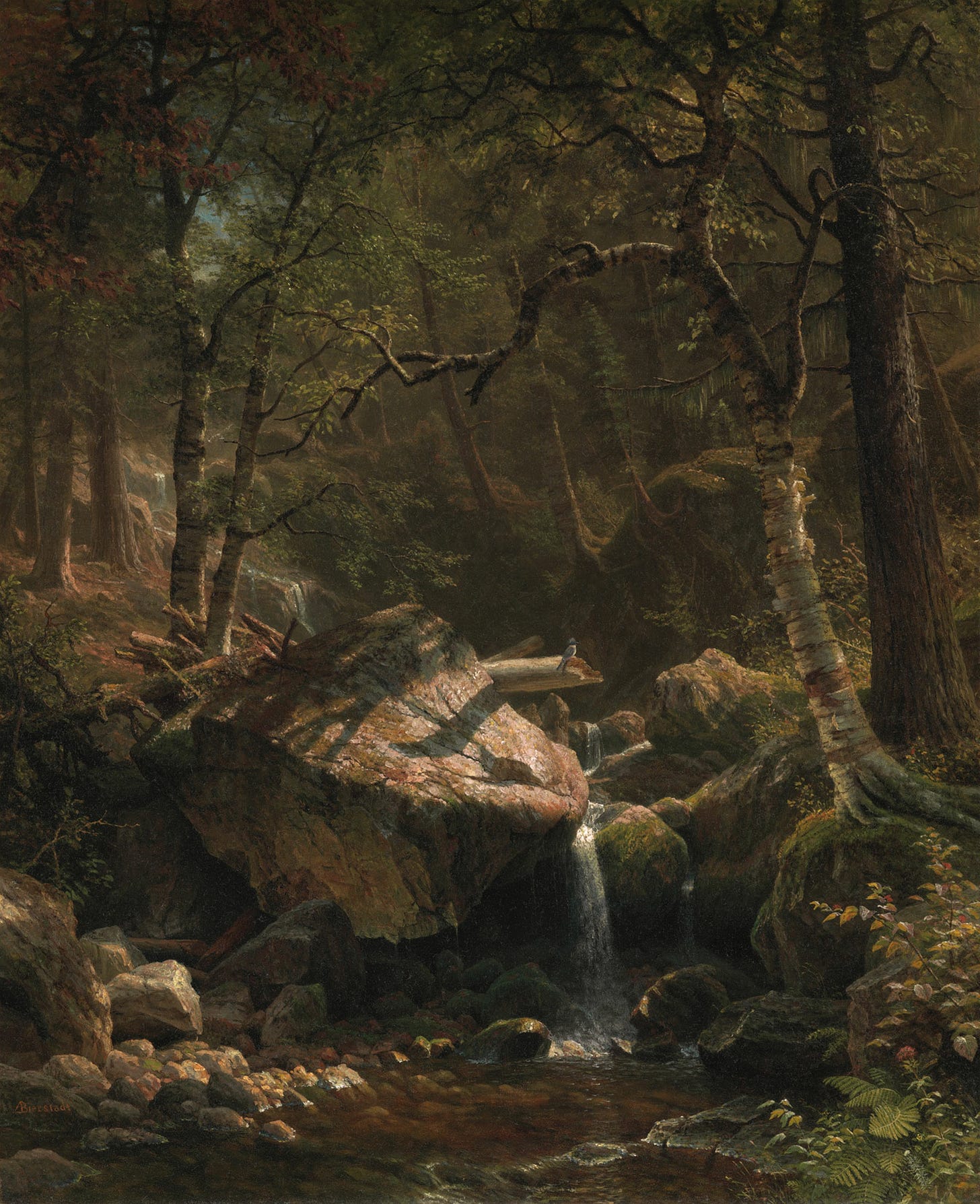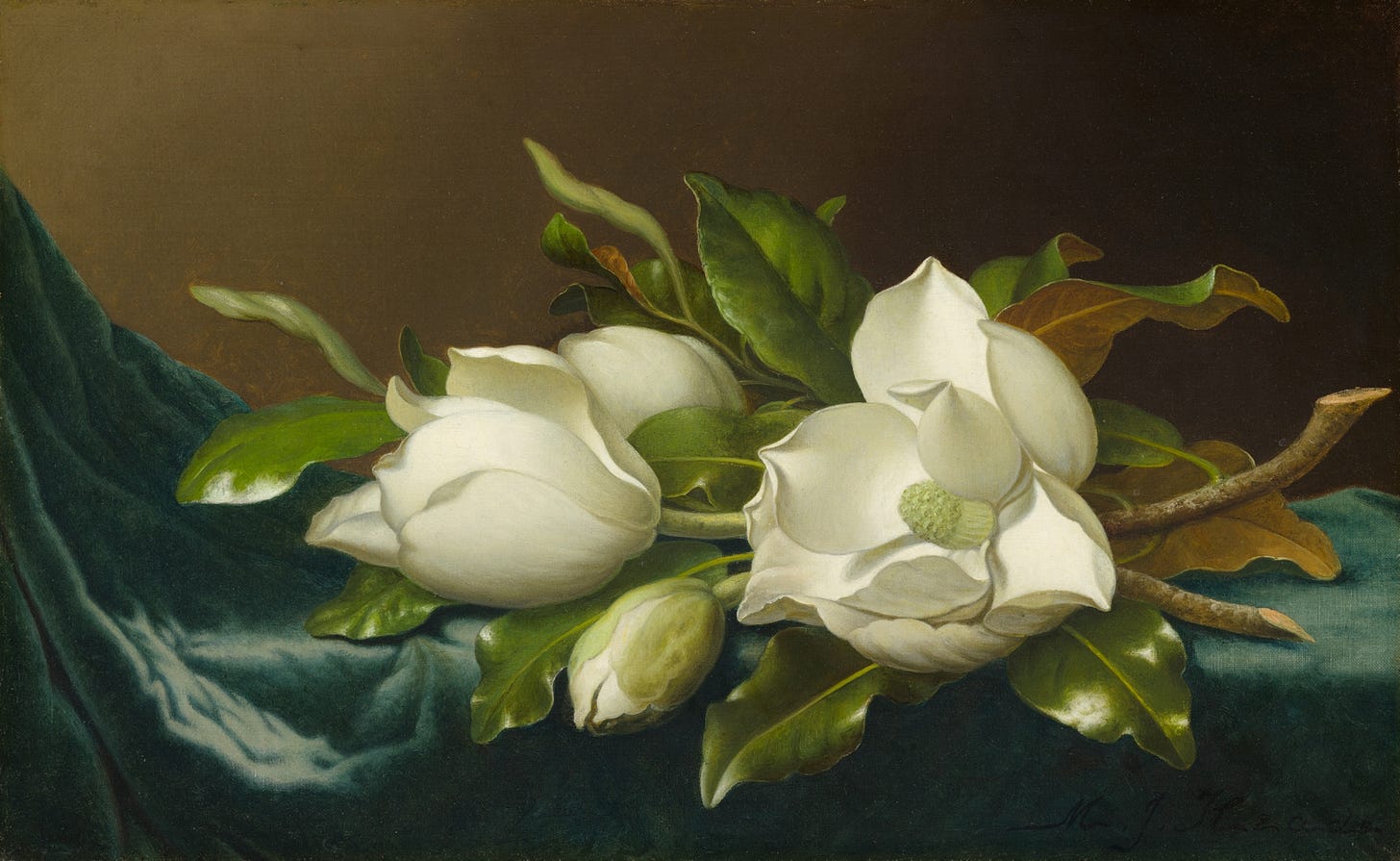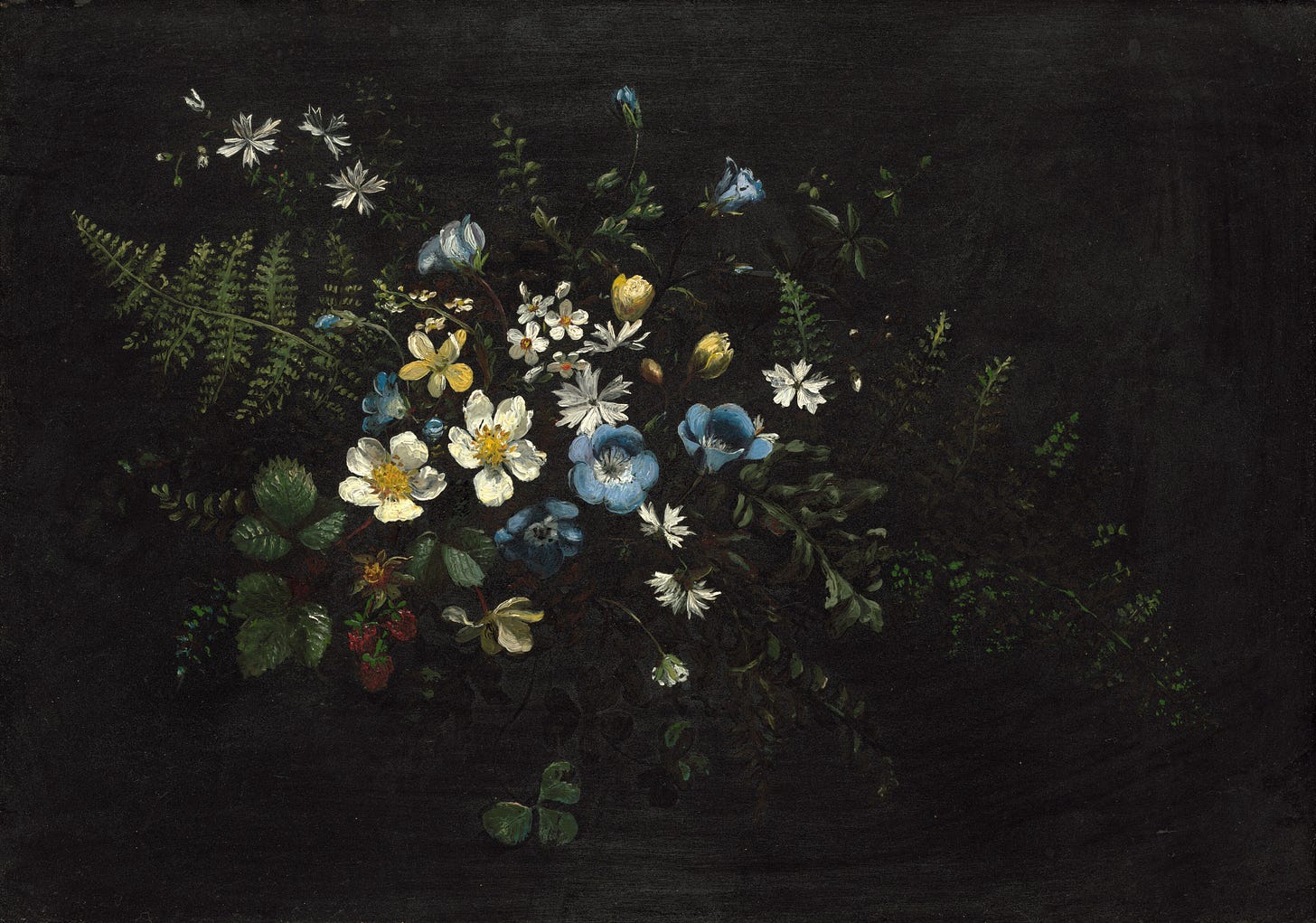(If you love this newsletter, please share it)
I am in Montana, and the bright overhead lights above me are frequently disturbed by these tiny tiger-striped moths whose origin and purpose is mysterious; unknown to me and the family I work for. There may be fifty or a hundred of these moths flying around in this above-garage room across from the main cabin. There’s a mini fridge in the corner which, in twenty-four hours, destroyed all my vegetables via freezing, and a small microwave, a small toaster oven, a bed, two tables. There goes another moth. Another.
I landed here yesterday after driving for a day and a half. The last portion of the drive led me up a Forest Service road covered in snow and ice. I didn’t know what to expect when I got here. It’s beautiful, with quirks. I don’t have very much control over my environment because I am at the will of my employers, who are trying very hard to make me comfortable and whose efforts I appreciate. I didn’t want to come, to be honest, because I knew it would be imperfect, but I also need my job and needed to get out of Seattle. To go somewhere. And, besides the moths and the frozen food and the sensation of work bleeding into my entire life which will surely last three weeks, it’s nice here. The family I work for is lovely. There’s a lot of snow; feet of it all set up like a picture book with fir and pine trees popping up through the smooth, shiny white surface, branches bobbing cheerfully in the breeze. There’s wind, and a gazillion stars, and this morning I saw a pre-sunrise sunrise. There’s mountains, both the one we’re perched on and the ones far away from us. I can see more clearly out here. It’s relaxing to look far off into a horizon and focus on the itty-bitty trees, the jagged mountains.
I always want it to be perfect. Sometimes it is perfect. Sometimes, every once in a while, I do something or plan something and it is exactly what I want it to be, but rarely. Usually there are pockets of perfection; smooth spots that feel nice to caress, surrounded by other surfaces, spiky or scratchy or slimy. Lots of things are like a beautiful wool sweater. I put them on because they’re beautiful but then they itch like hell.
Once, decades ago, I was at a movie theater by myself and there were these two older women sitting near me. They were chattering, and their volume interrupted my viewing pleasure. Soon I wasn’t watching the movie at all, but waiting for them to make another noise, to disturb me more. I saw myself waiting, almost wanting them to disrupt the movie. Did I want something to be angry? I laughed at myself and still remember my internal monologue, my lifelong buddy, the popcorn gallery: There will always be noisy people in the movie theater.
I didn’t mean it exactly. There’ve been many times the theater has been appropriately quiet. I meant, in general, there is always gonna be something to piss me off or annoy me. The world is never going to bend to my will. I will not dodge bullets by leaning backwards. There will always be something. And my reaction is my choice. Sometimes, depending on what the something is, it may be necessary to take action; but most times, acceptance is the key to my own happiness.
On my solo rode trip I drove an old Subaru belonging to my employer. No stereo; noisy, loose windows, and all their stuff in the back of the car, which I’d packed and was bringing to them. I kept getting upset. Driving sucked; I used to love driving! It was long. I’d driven it before. It was pretty, sure, but I was expected to make good time, no room for stopping and enjoying scenery. I could barely hear my podcasts through my headphones over the wind slicing through the windows, which wouldn’t close all the way.
Wow, I’m grumpy, is what I thought a few times. It’s not like I was being forced to do it. I could have said no. My airbnb, a pretty nice place in Missoula, was paid for, and this was an adventure. Halfway through the first day I finally got an email from my editor, who told me she hadn’t finished my book yet, but could I revise it? She gave me a few lines of incredibly general feedback. I’d heard from my editor! I could start on my book again! Who cares if she hasn’t read the whole thing, right?
I drove through Butte, a small town situated in the mountains in Western Montana where I’d once stopped to sing karaoke and have bad sex with someone I met at a bar. I remembered my past self, always wanting to create something significant, a big distraction from the present moment, which was intolerable in its propensity for quiet, whose permeable walls admitted thoughts and feelings I didn’t want to think and feel. Oh, past self, you sweet degenerate. I forgive you, I guess. If I could go back in time I wouldn’t change you, but befriend you and love you unconditionally. That’s what I’m doing now, as I remember you.
Accepting things as they are means accepting things as they are.
As our recovery friends say: Give me the serenity to accept the things I cannot change, the courage to change the things I can, and the wisdom to know the difference. My younger self knew that prayer, recited so many times by my grandmother, who was in recovery, but hadn’t yet truly metabolized the concept of acceptance, or maybe the word acceptance didn’t quite reach the concept being gestured towards. Acceptance, like tolerance, seems wrongly used, because it means only to say okay, you can come in. Maybe instead of acceptance I want to use embrace (include something as a constituent part) or integrate (accepting fragmented parts of the selves). Acceptance, as one word, is more complex than it appears, and deserves contemplation.
Around this time last year I was packing my things in the UK, where my house-sit was ending, and getting ready to travel to Scotland, Iceland, and then home, to Seattle, where I was going to move in with roommates. All my planned house-sits in the U.S. had slowly fallen through until I had to cancel the rest. It was March, and I’d had house-sits planned until July, when I was supposed to turn in my book. I needed quiet and solitude for writing, but I couldn’t afford to live on my own.
I’d been watching Covid-19 unfold first on French and then on British television; we weren’t calling it a pandemic yet. In the mornings I wrote in a little sunroom in a little cottage in the center of a town called Chichester, with a blind and deaf cocker spaniel as my companion. Nights, I had panic attacks and tried to conserve the lorazepam I’d gotten in France. A few days before leaving Chichester, I went to the Tesco to get hand sanitizer for my trip and there was none. No masks. Nothing. I flew to Scotland and, after spending a night in the hostel with several people who coughed through the night, I splurged on a private room where I slept poorly and woke up to the news that all Americans needed to come home or else were at risk of being stranded abroad. My Fulbright friends were scrambling, trying to decide whether to stay or go.
I walked the streets of Edinburgh and met a lovely friend who also happened to be the last person I hugged before things got really bad. I remember wondering if I should hug her. I’m glad I did. We went to a speakeasy where she bought me a drink fit for the world of Harry Potter. It was the last time I was in a bar. I bought a pink scarf and flew to Iceland, where I mostly just stayed in my hotel room and ate chocolate covered Lakris. My only ventures were the penis museum, the tall jagged church where I gazed out over the frozen city, bookstores, Brauð & Co. Bakery, and a soup restaurant. I walked the sidewalks of Reykjavik wrapped in my Scottish scarf, my hands in my pockets, wondering what was happening in the world and not wanting to go back to the states, which seemed like a shitshow. Couldn’t I just stay in Iceland and read Icelandic literature and become Icelandic, like Bjork? I liked the snow and the way the sky made the water so dark and the striated mountains across the ocean. I wanted to build a small fairy village and live in a house with a living roof.
There was no social distancing on the plane, and I waited for almost everyone to board before I got in line. I wiped my tray table with a precious Italian sanitizing wipe, one of my last. The couple next to me were retired Forest Service employees from Oregon. I wanted to ask if I could go home with them, to their tiny town and house in the woods. I knew I was flying into a world where Lysol wipes, masks, and toilet paper weren’t accessible. Upon arriving in Seattle I got my temperature checked; a formality. Here I was, back in my home country. It felt safe to be home, where everything felt familiar, even if it was terrible. I kept my scarf over my mouth and stayed distanced from the person in front of me. Most people didn’t seem to mind being close to one another. In my Iceland hotel room I’d made a long Instagram story about how we needed to take this seriously, and I could make that same video today, nearly a year later.
Had any of us wrapped our minds around how dire things were? Had any of us, particularly Americans, known how terrible we were? I borrowed a friend’s apartment in the U District and quarantined for two weeks. I watched Love Island and wondered if I had Covid. I acquired a wheeze in my chest that turned out to be asthma. I hugged my friend’s large Costco package of toilet paper and coveted her Lysol wipes (there were only a few left), which I used to wipe down my groceries. It was lonely there; not fun at all. I tried to write but couldn’t. I spoke to my editor, who gave me notes on the first half of my book. I interviewed someone with the Park Service.
It felt dangerous to move in with roommates; I cried to my therapist about not being able to afford my own place. I’d set up a nanny job but it fell through because they weren’t essential workers.
I remember those couple months of spring, temporally thrown into an abyss from which they’ll never be recovered. Long, long walks from my shared house in Ravenna to Magnuson Park, which was virtually abandoned, its parking lot closed. The lapping waves of Lake Washington, the crystalline view of Mt. Rainier, unobscured by smog or clouds, the floating puffs of cotton covering the parking lot, their smell evoking my childhood. Bunnies hopped through the bushes. The sun shone. I wished the city always felt abandoned, I wished I always had it to myself like that. I walked through Ravenna Park; the bare branches of deciduous trees sprouted bright green leaves. At home I wrote in the basement or in my room. With my unemployment I bought a bed and food and paid for my storage unit. Mid-summer, I marched for Black Lives, but not as much as I should have, or wanted to. I read My Grandmother’s Hands. My roommates and I had important conversations.
In August I turned in my book, only a month late. It was a mess, and so was I. Living with roommates was hard in a pandemic, but writing was harder.
When I look at the last year, I see immense growth. Some of it was involuntary. I have no nostalgia for early pandemic times— things were hard, and they were easier for me than many, but harder, too. I took a nanny job only to have it end abruptly when the protests started. I struggled with hypochondria and intense anxiety. I felt isolated and without community. I was being crushed under the pressure to finish my book, and was writing about the most traumatic things I’d ever experienced while also experiencing something traumatic. I wanted friends, and had few. But spring came, summer, and I turned forty. My birthday was lonely but beautiful, spent house-sitting in Port Angeles, WA, and in autumn I was established enough at a new nanny job to decide to move into my own apartment. And here I am, it’s nearly spring again, I will turn forty-one this summer. I am beginning work on my book again, and in the midst of a wonderful yoga teacher training. I have no partner, and that’s okay. Community is building. I have ideas for how I want to be in the world, for where I want to go and what I want to do, and I’m doing my best to live into those ideas. I am one of the lucky ones, fully vaccinated (I hope everyone will join me soon). And there’s a new president. And a new relief bill has passed. We still have a lot of work to do, no doubt, but we are making progress.
I have been sober for seven months. Eight? I can’t remember. Inside this last year I have done a lot of healing, especially around my relationship with food, which now finally feels balanced (for the most part).
I wonder, what have you done? What incredible resources have you found inside yourself this year? How have you taken care of yourself and others throughout all of this? Likely a lot. Likely so much. I hope you’re giving yourself love, and acknowledging your adaptability. All of us have had a transformative year. Many of us are still struggling. But pausing in the struggle and noticing how far you’ve come is important, too. Please tell me in the comments something you’ve done this year, that you’re proud of. Tiny or gigantic, doesn’t matter.
Things I’ve loved this week:
I went to Elliott Bay Books and saw that my MFA thesis advisor’s book has come out! His name is George Saunders and the book is a gem, called A Swim in a Pond in the Rain, it’s essentially a permanent craft class in Russian literature. Of course I bought it, hardcover. The more I study Buddhism, the more I appreciate George, whose renowned kindness is true and real. Once, when I was an undergrad, I wrote a paper about one of George’s stories, The Semplica-Girl Diaries (which I also taught to high-schoolers) and my English professor gave it to him. He read it and met with me in his office. I also once gave my friend Tim Dyke (an incredible writer and teacher in his own right) George’s school address, and Tim’s high-school students wrote George letters. George, one of the busiest writers on the planet, took the time to answer some of those letters. What I love about George and what I’ve learned from George is to consider everything. Never close your mind to anything. Allow everything in and decide for yourself. Also, be kind, always.
Gosh, I have been so into Beethoven lately. He was so brilliant. Did you know that? I’m not sure everyone knows how brilliant he was. Anyways, here’s Glenn Gould chatting about how Beethoven melted the fugue into the sonata, and playing a bit:
And here’s Hélène Grimaud playing Piano Sonata Nº31 Op110, which is such a beautiful experience to watch and listen to.
I watched the entirety of Killing Eve and loved it— the romance between Eve and Villanelle, the ways the series plays with viewer’s expectations, and (very pandemic appropriate) all the traveling. Plus Villanelle’s costuming, which is so good. I want her Spanish apartment. It’s a fun show to watch as long as I don’t think too deeply about it, because for me there were some *inconsistencies* but that’s okay, right?
I also watched the BBC show Victoria. I found it so British, a little overly rose-colored, but a joy to watch.
Hm, what am I reading? Yoga books. Buddhist books. I listened to Her Body and Other Parties on my way out here. I’ve already read it, but wanted to read it again.
I’ll be immersing myself in my wildland fire research again.
My friend Kate Washington’s book is coming out swoon (typo and it stays)! It’s called Already Toast: Caregiving and Burnout in America. I’ve already pre-ordered it and am so excited to read it.
My friend Alexandra Chang’s book, Days of Distraction, came out a year ago. She was one of the many writers whose debuts were fucked up by the pandemic. If you haven’t read it yet, definitely check it out.
If you’re a paying subscriber, you’ll receive a lil extra newsletter this week and a short guided meditation.







